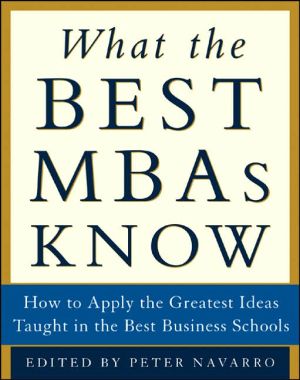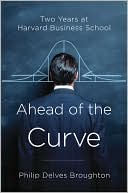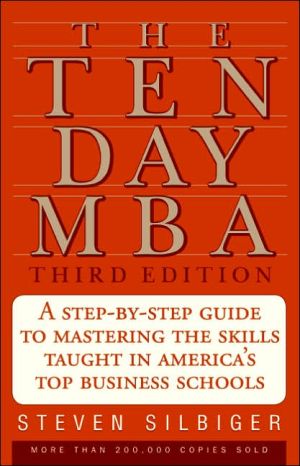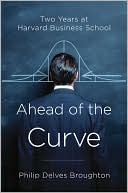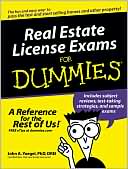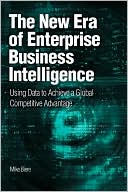What the Best MBAs Know
Easy access to the essential knowledge and skills of a top-level M.B.A. program—without having to attend a lecture\ What the Best MBAs Know provides professionals who don't have the coveted M.B.A. designation with the skills and knowledge taught in today's finest programs. Professors from Stanford, MIT, Northwestern, and other influential programs contribute detailed chapters on broad-scope topics such as strategy, functional areas including accounting, and key disciplines from managerial...
Search in google:
Get the knowledge and skills taught in today's top MBA programs—without ever setting foot inside a classroomWhat the Best MBAs Know presents the key concepts, tools, and wisdom being taught in leading MBA programs from Northwestern's Kellogg School and the Wharton School to Stanford and USC. Featuring contributions from the most accomplished business school professors, each chapter takes you inside their classrooms for a detailed look at topics from marketing, finance, and managerial economics to leadership, corporate strategy, and more. Theoretically solid and applications-based, What the Best MBAs Know is both a valuable resource and a ready reference to the core knowledge obtained with an MBA.Includes contributions by: Charles P. Bonini, Graduate School of Business, Stanford University Leslie K. Breitner, Daniel J. Evans School of Public Affairs, University of Washington Jeffrey F. Jaffe, The Wharton School of Business, University of Pennsylvania Richard J. Lutz, Warrington College of Business Administration, University of Florida Steven L. McShane, Graduate School of Management, University of Western Australia Steven Nahmias, Leavey School of Business, Santa Clara University Peter Navarro, Graduate School of Management, University of California, Irvine Stephen A. Ross, Sloan School of Management, Massachusetts Institute of Technology Daniel F. Spulber, Kellogg School of Management, Northwestern University Mary Ann Von Glinow, Florida International University Barton Weitz, Warrington College of Business Administration, University of Florida Randolph W. Westerfield, Marshall School of Business, University of Southern California What the Best MBAs Know covers the breakthrough strategies, techniques, and ideas that are being taught in the classrooms of today's top MBA programs. University of California business professor Peter Navarro joins more than a dozen of his colleagues—including Stephen A. Ross of MIT's Sloan School, Daniel Spulber of Northwestern's Kellogg School, and Charles P. Bonini of Stanford University's Graduate School of Business—to provide you with the key concepts, tools, and knowledge that, until now, could only be obtained through an MBA degree. This comprehensive book—as engaging as it is informative—covers virtually every subject taught in an intensive MBA program, including: The Big Picture: An Overview of the MBA Curriculum Management Strategy: Five Steps to Successful Strategic Analysis Macroeconomics & the Well-Timed Business Strategy Strategic Marketing: Delivering Customer Value Operations and Supply Chain Management: Getting the Stuff Out the Door Financial Accounting: "Doing the Numbers" for Investors, Regulators and Other External Users Managerial Accounting: "Doing the Numbers" for Decision Making and Control Corporate Finance: Big Questions and Key Concepts Organizational Behavior: The Power of People and Leadership Statistics, Decision Analysis, and Modeling: How the Numbers Help Us Manage Managerial Economics: Microeconomics for Managers In each chapter, What the Best MBAs Know first identifies the key concepts of a subject like strategy or finance. One of the world's top business professors then illustrates how these concepts are applied on a daily basis in the rough-and-ready world of international business. The insights of these top professors throw open the doors of the best business schools as they highlight the latest strategies and tactics driving today's intensely competitive landscape.Whether you are currently pursuing an MBA, already have an MBA but need to refresh and update your information, or simply want to arm yourself with MBA-level knowledge without the time and financial commitments involved in obtaining the degree, this all-in-one resource will help to place you on the same strategic playing field as your competitors.Peter Navarro is a business professor at the Graduate School of Management, UC-Irvine. He is the author of the bestselling investor’s guide, If It’s Raining in Brazil, Buy Starbucks, marketed worldwide in several languages. His articles have appeared in publications ranging from BusinessWeek, Forbes, the Harvard Business Review, and the Sloan Management Review, to the Wall Street Journal, the New York Times, and the Washington Post. His media appearances include Bloomberg TV, CNN, CNBC, Marketplace, NPR, and all of the major news networks. His multimedia CD-ROM package The Power of Economics is distributed widely on college campuses. For more information, visit the author's website at www.peternavarro.com.
Pt. 1The big MBA pictureCh. 1Who should read this book?1Ch. 2The big picture - an overview of the MBA curriculum6Pt. 2The strategic and tactical MBACh. 3Management strategy - five steps to successful strategic analysis19Ch. 4Macroeconomics and the well-timed business strategy57Pt. 3The functional MBACh. 5Strategic marketing - delivering customer value87Ch. 6Operations and supply chain management - getting the stuff out the door119Ch. 7Financial accounting - "doing the numbers" for investors, regulators and other external users152Ch. 8Managerial accounting - "doing the numbers" for internal decision making and control171Ch. 9Corporate finance - the big questions and key concepts194Pt. 4The organizational and leadership MBACh. 10Organizational behavior - the power of people and leadership227Pt. 5The MBA toolboxCh. 11Statistics, decision analysis, and modeling - how the numbers help us manage261Ch. 12Managerial economics - microeconomics for managers287Ch. 13Concluding thoughts318
